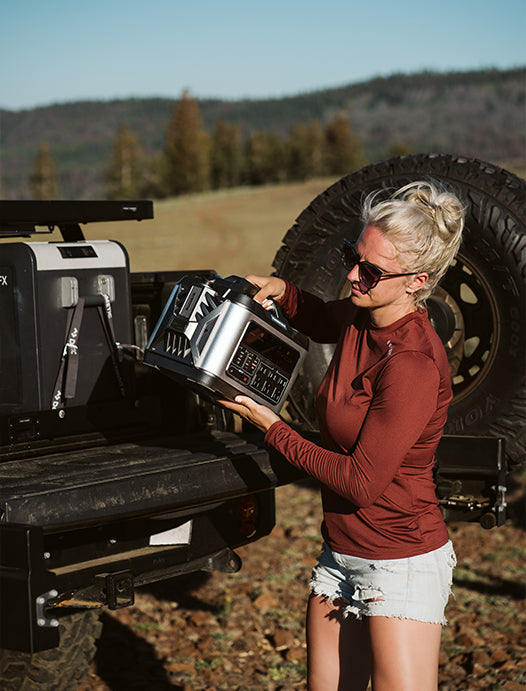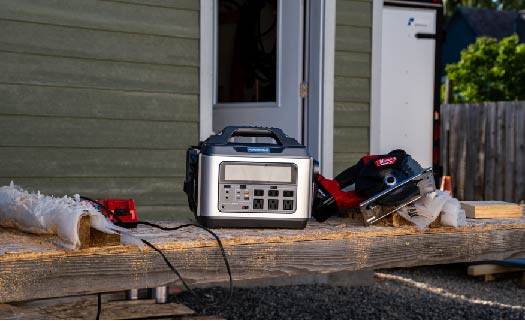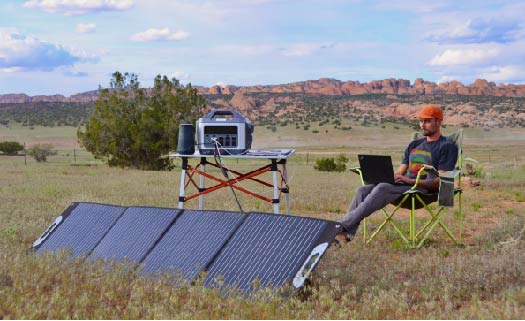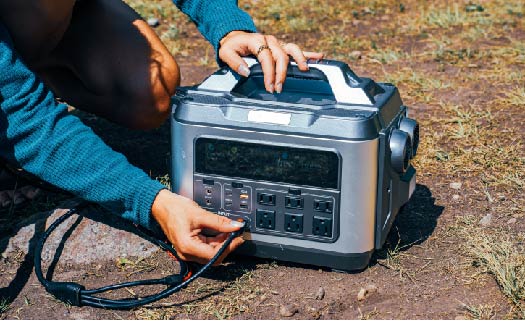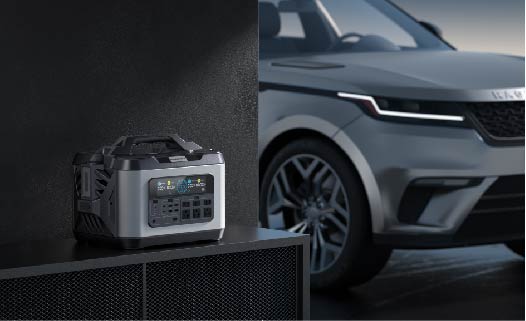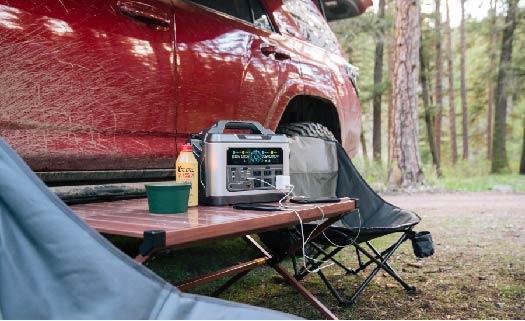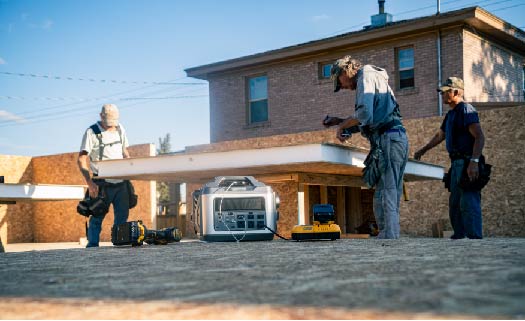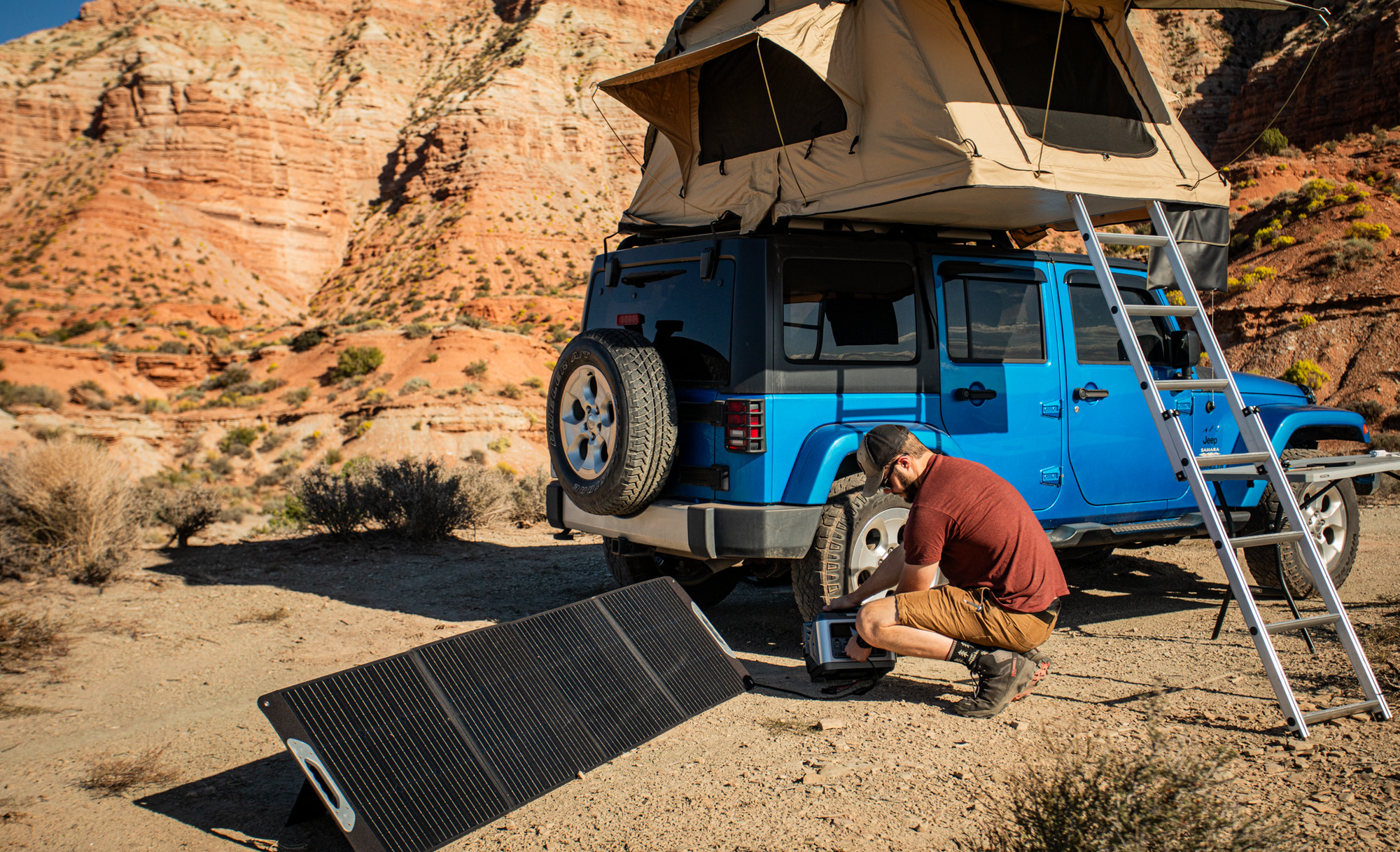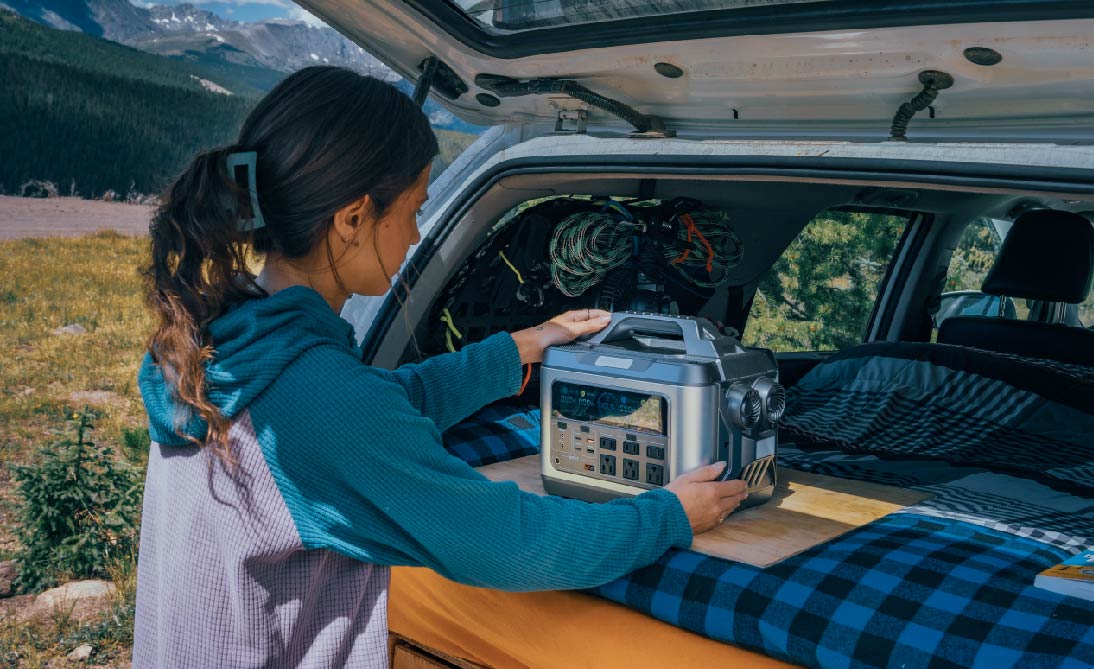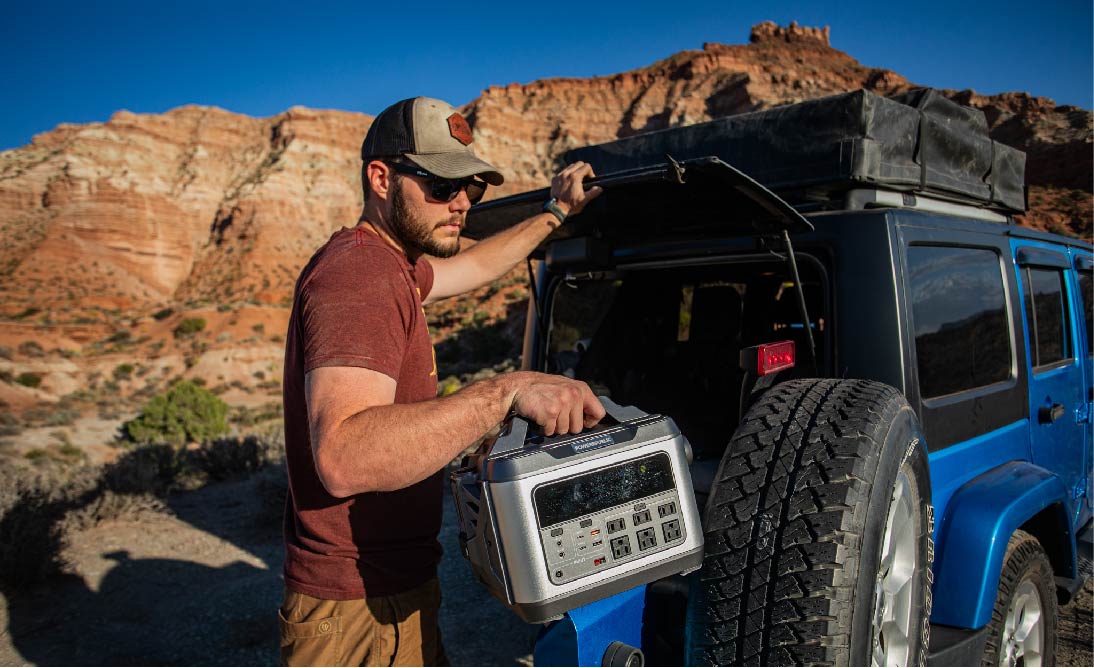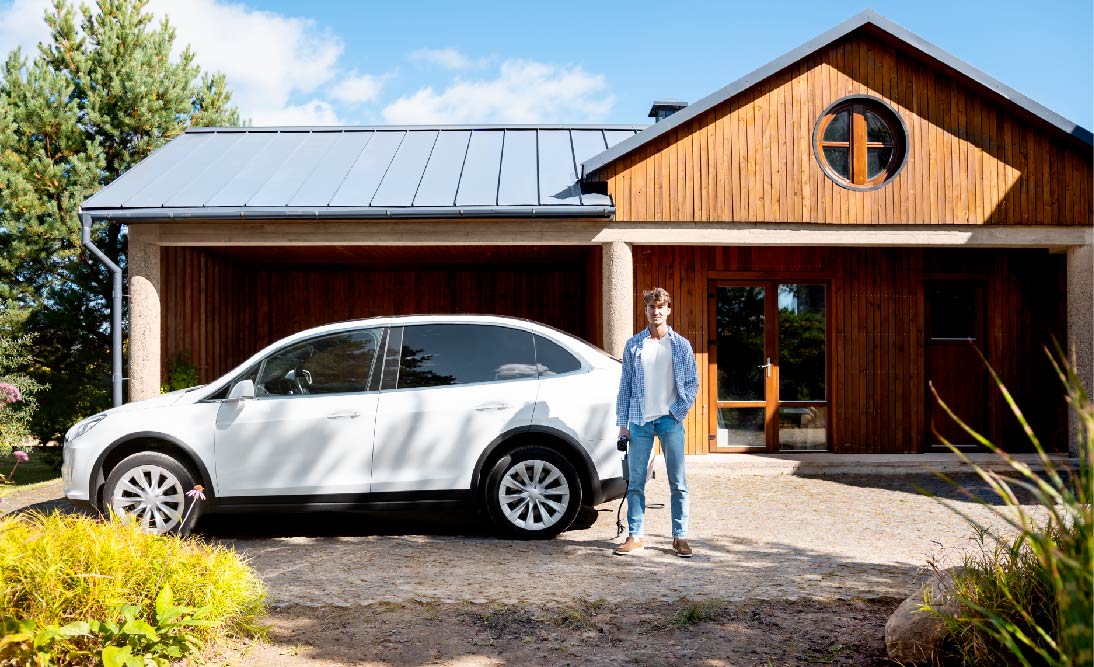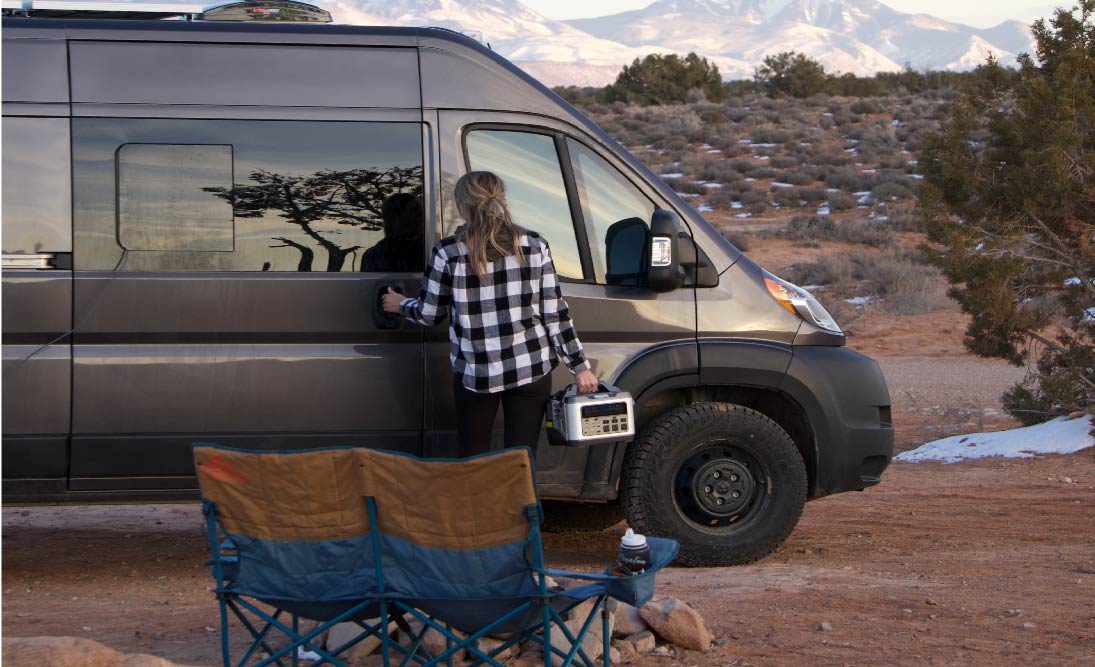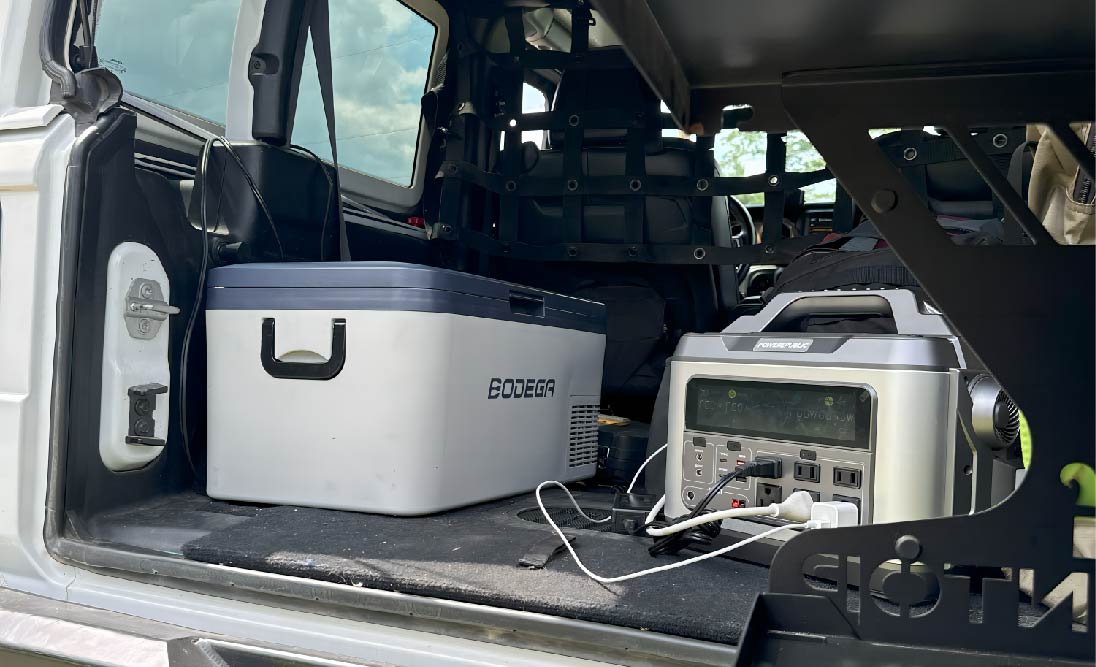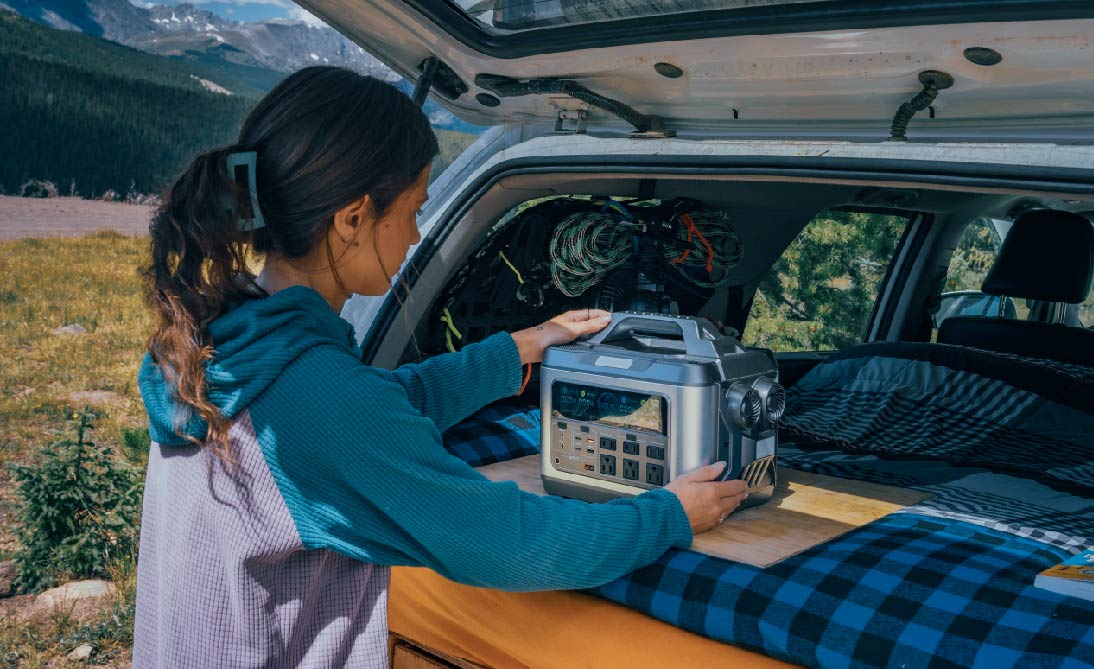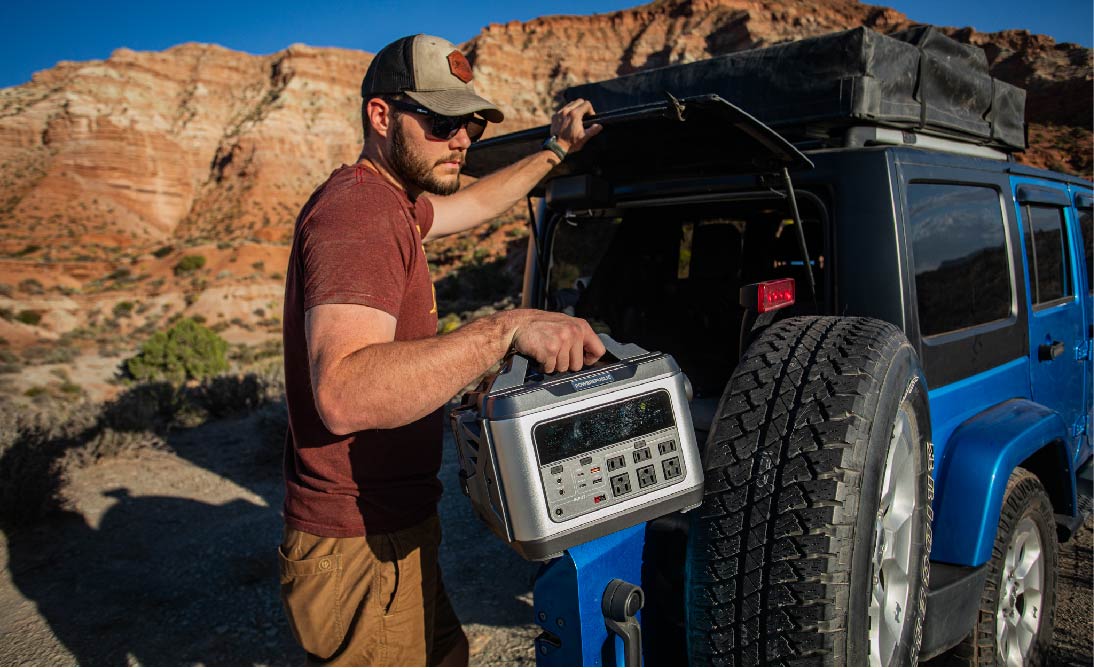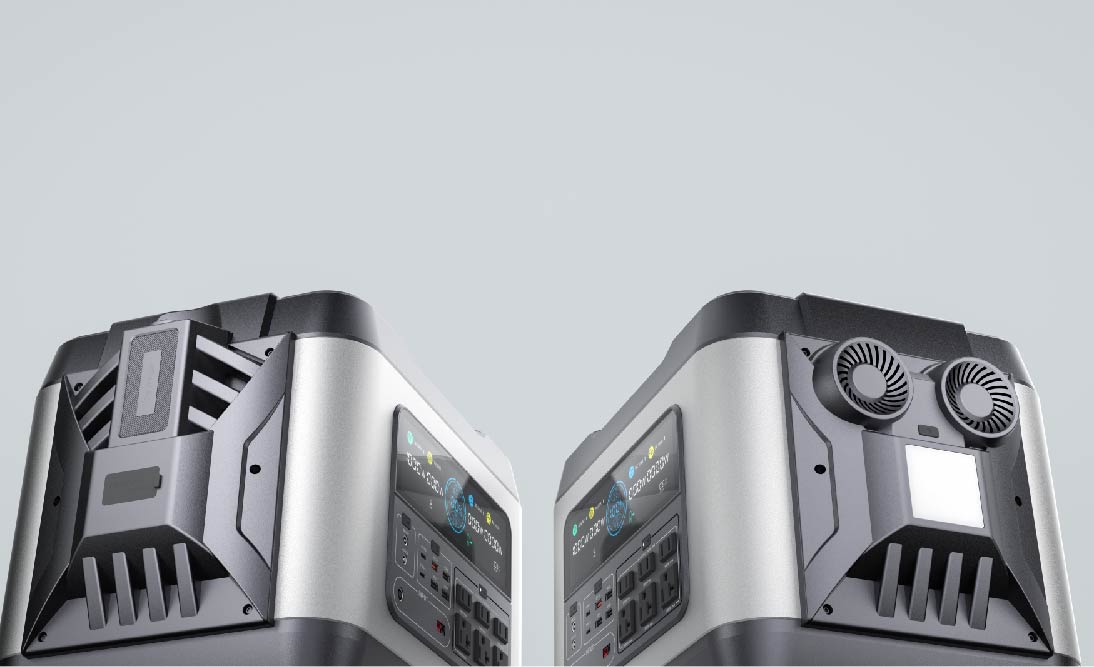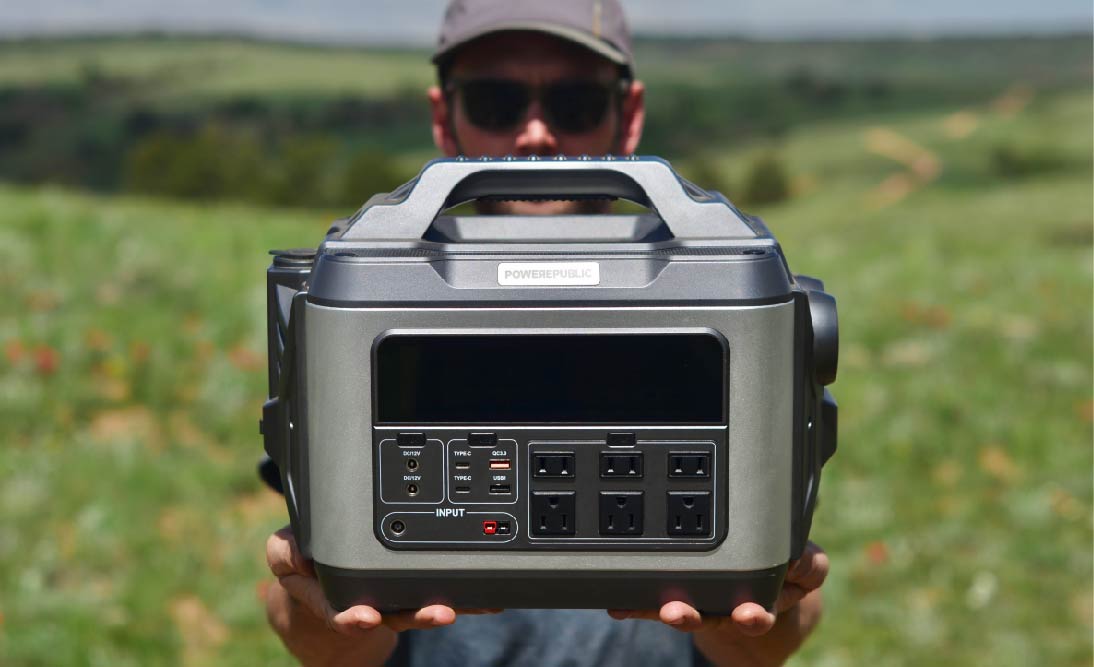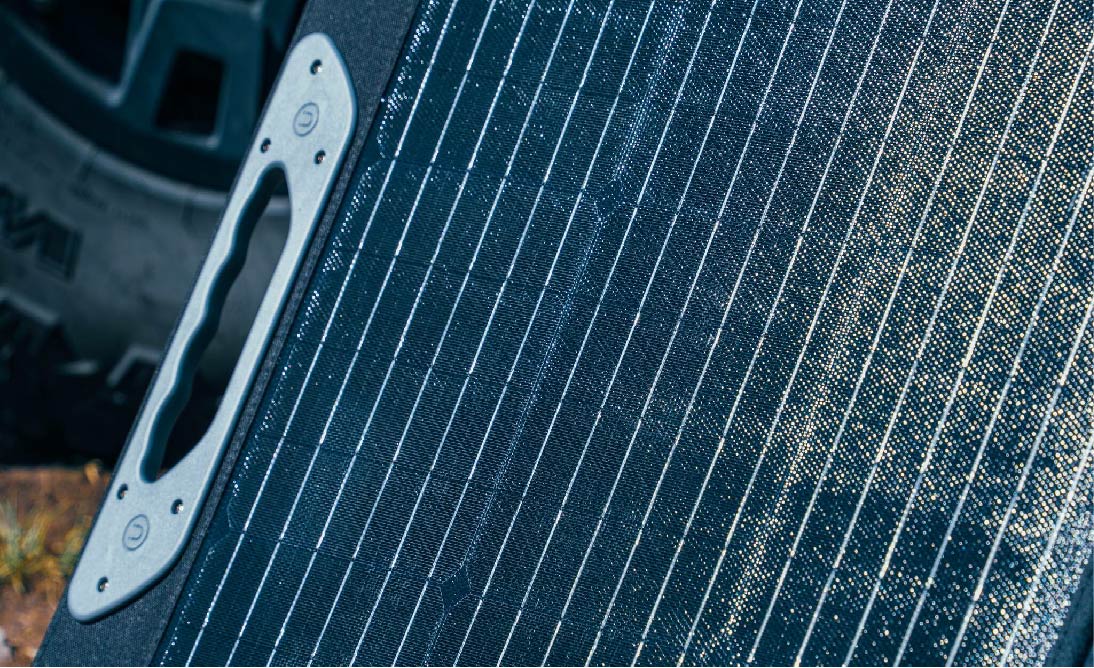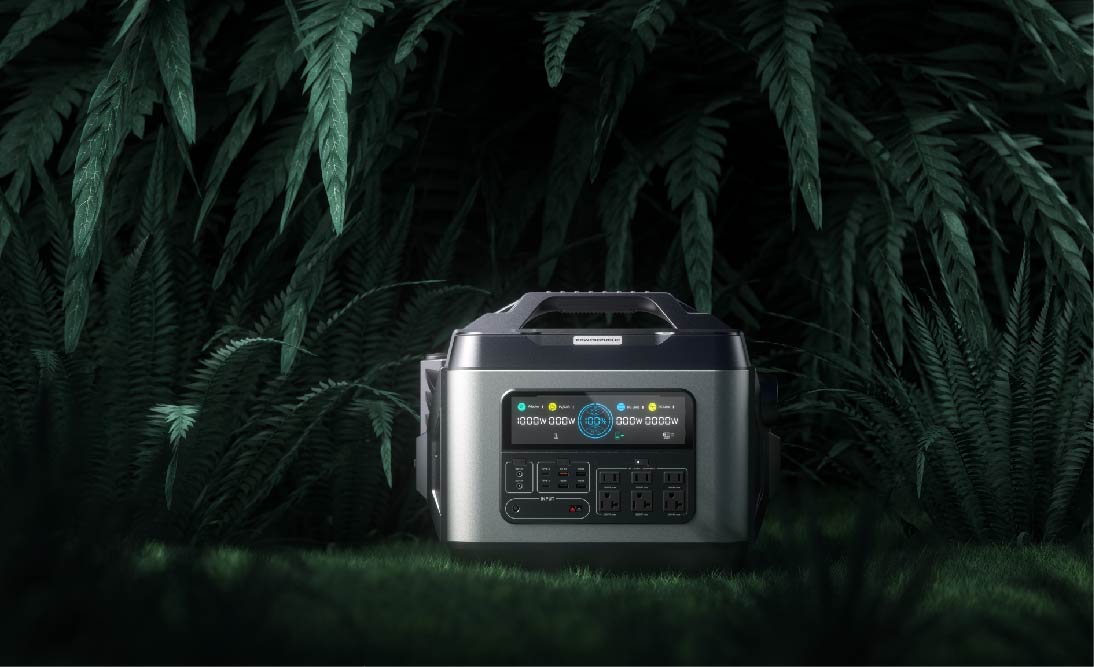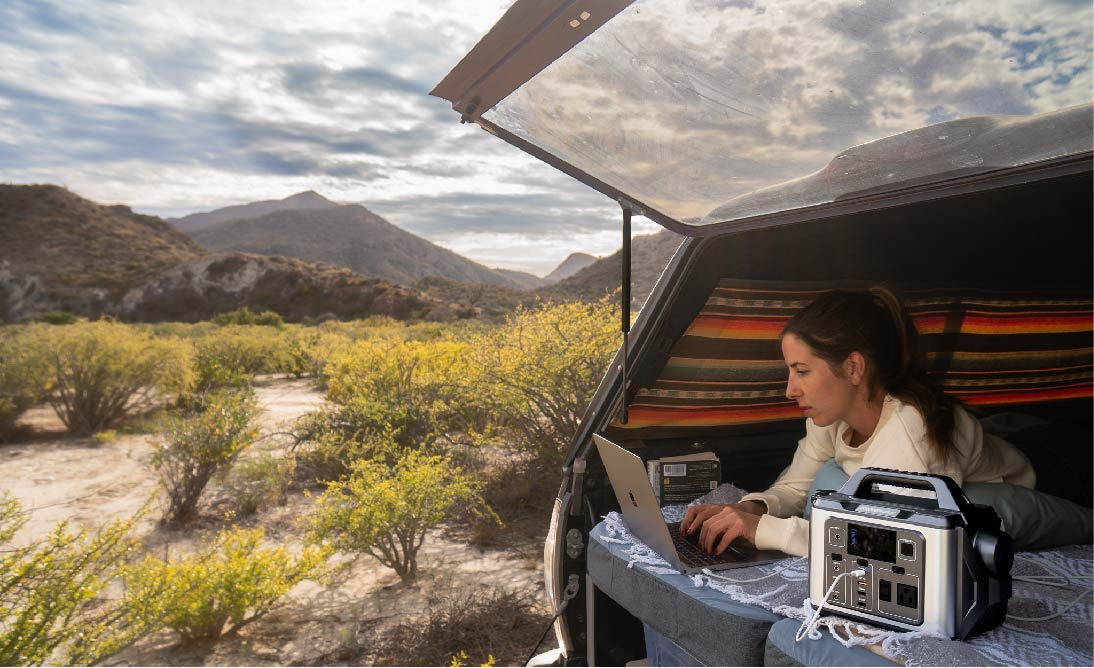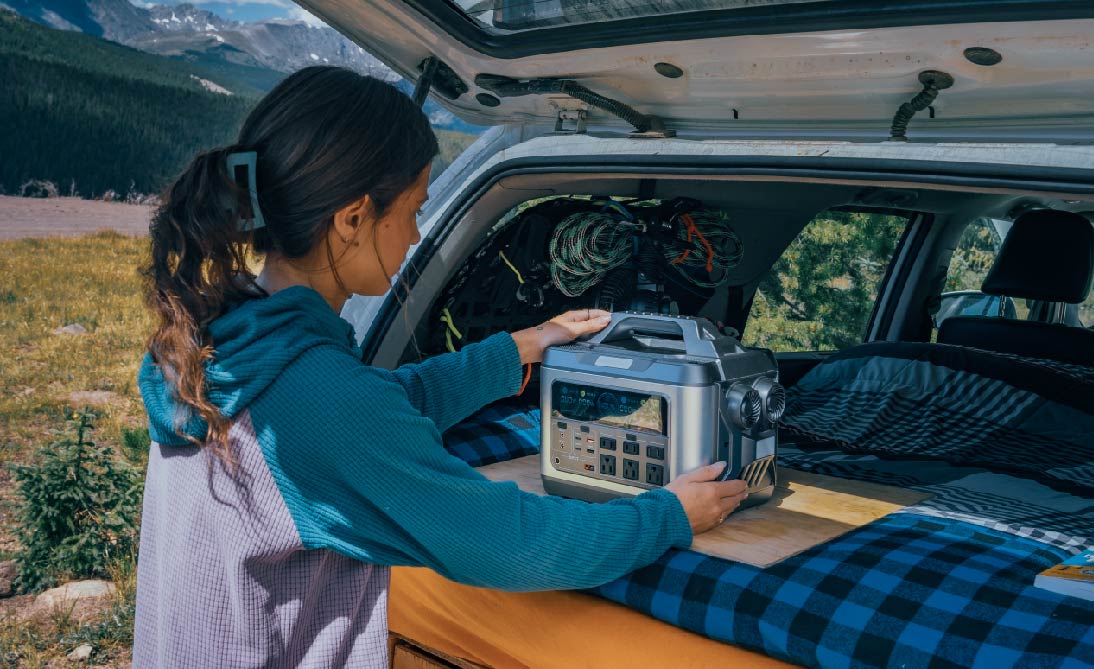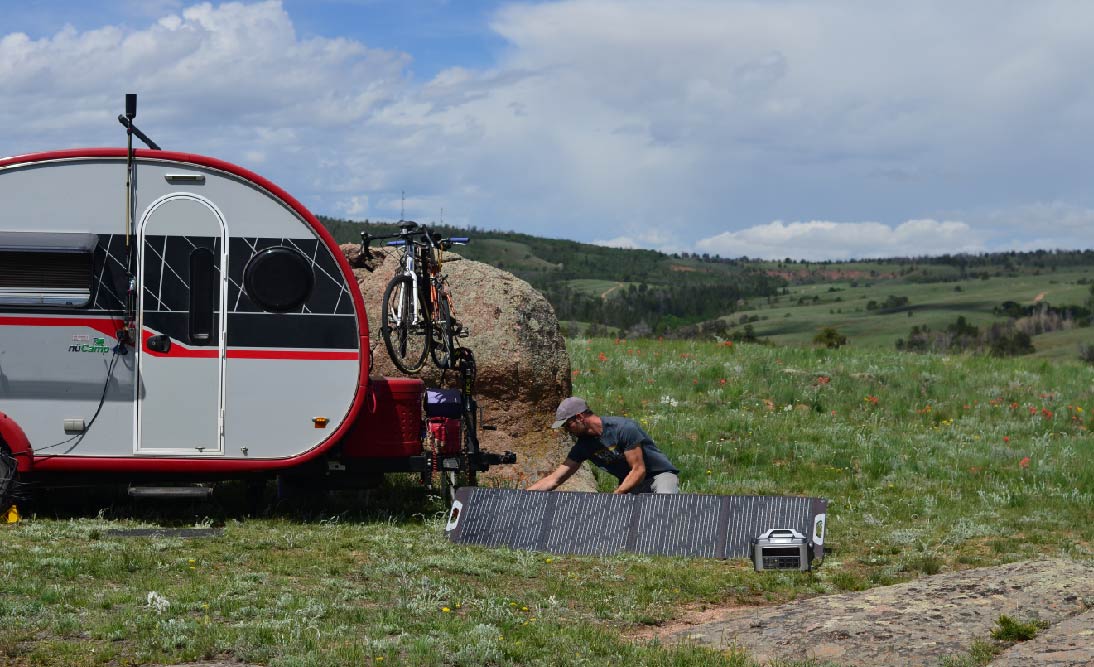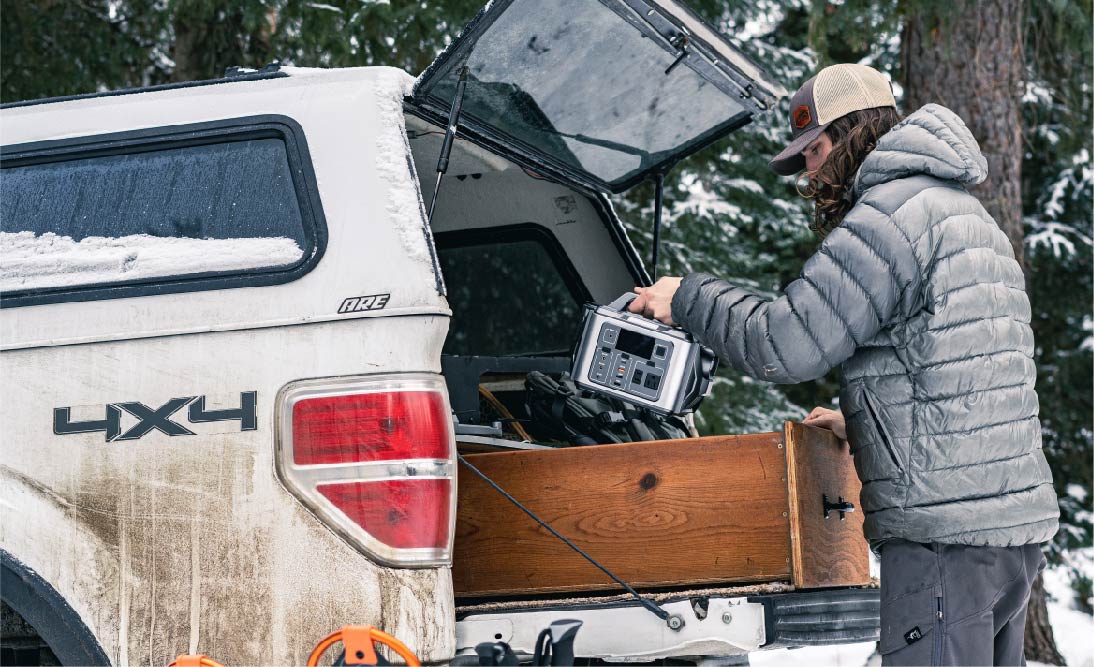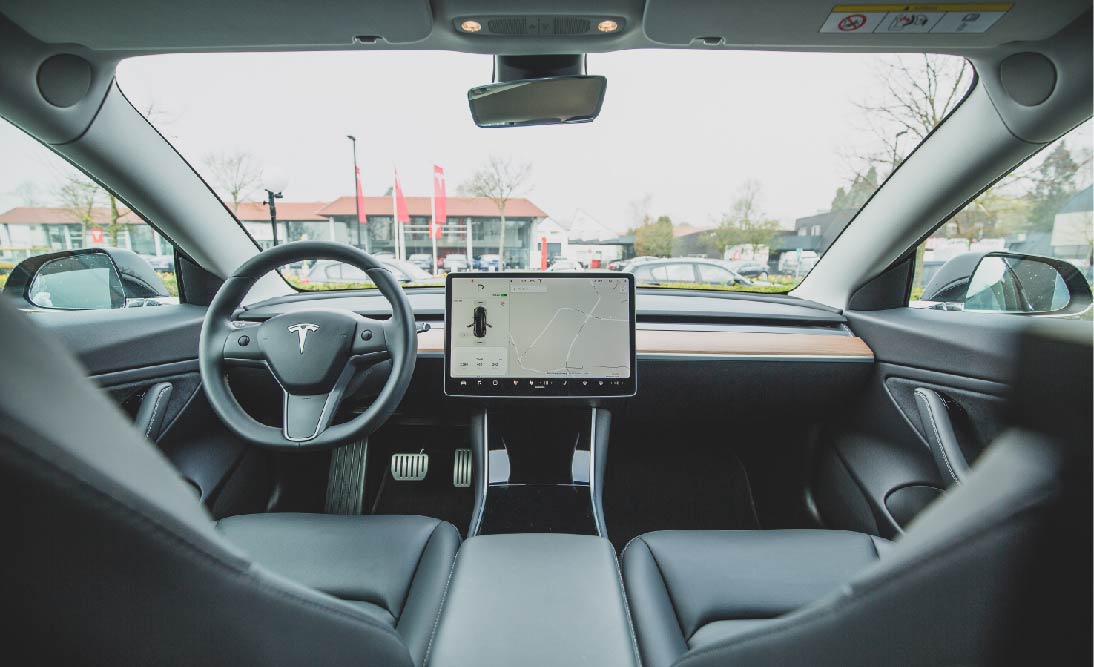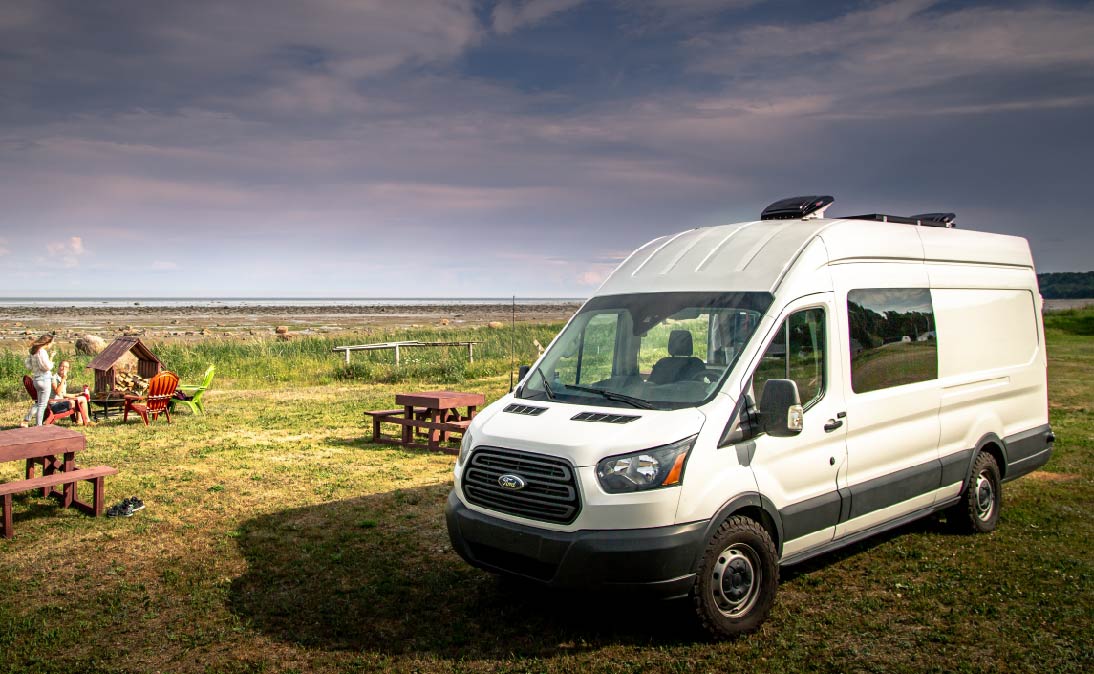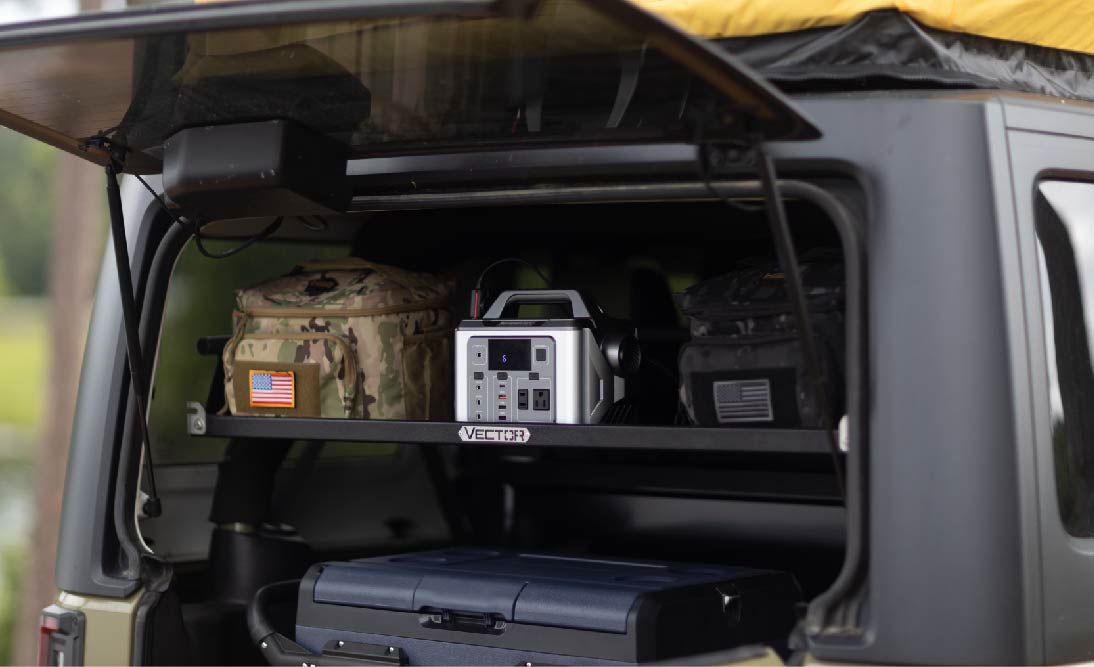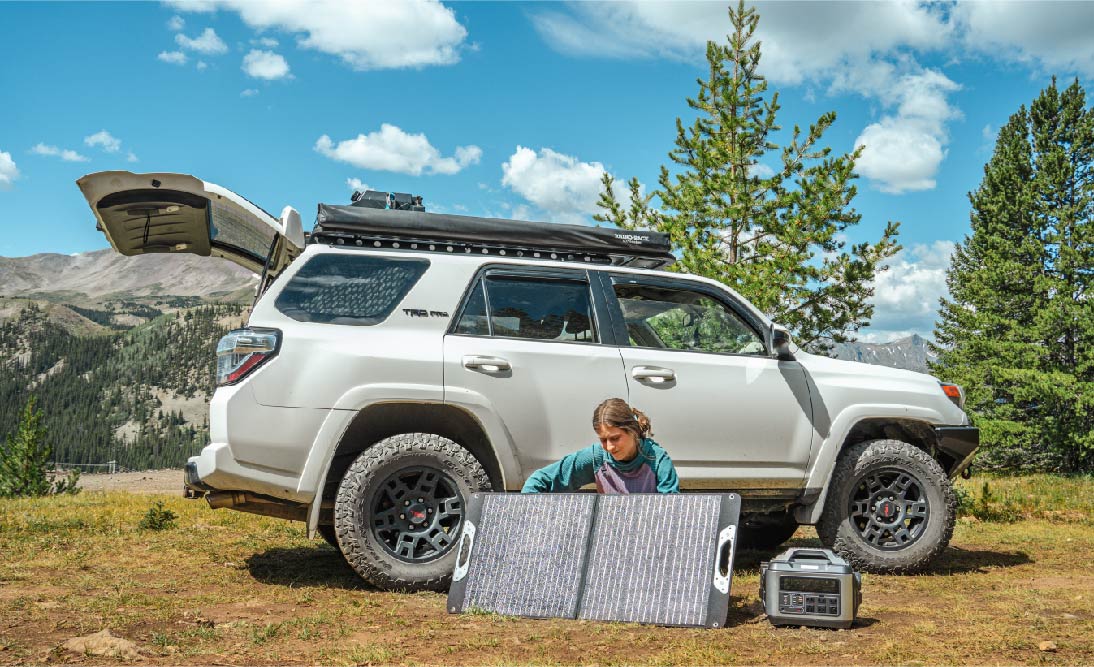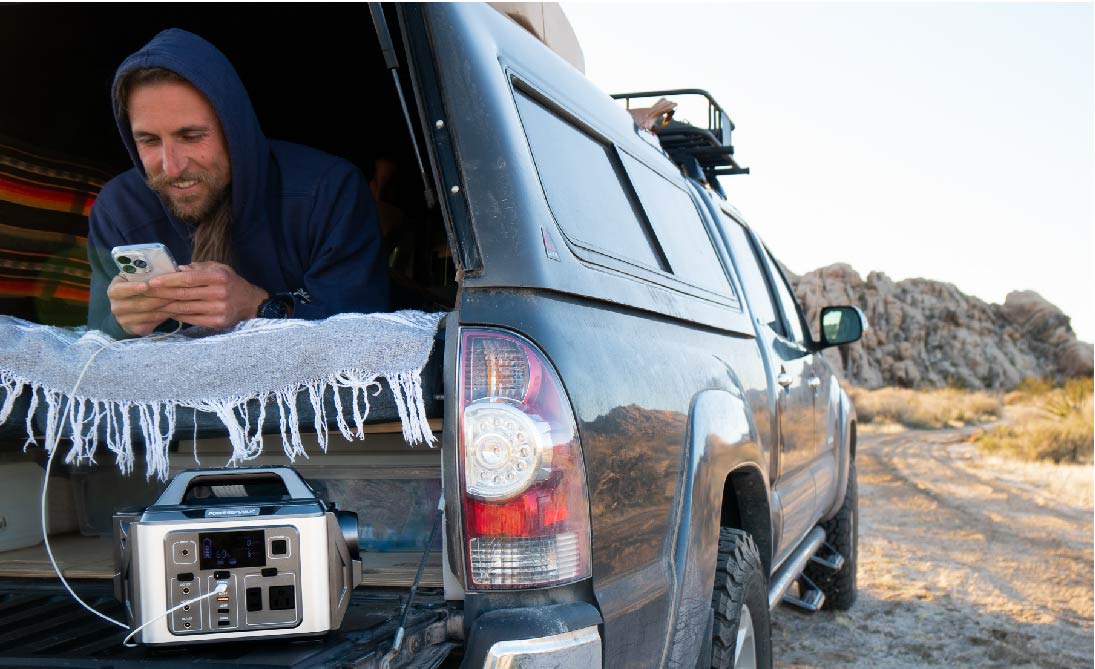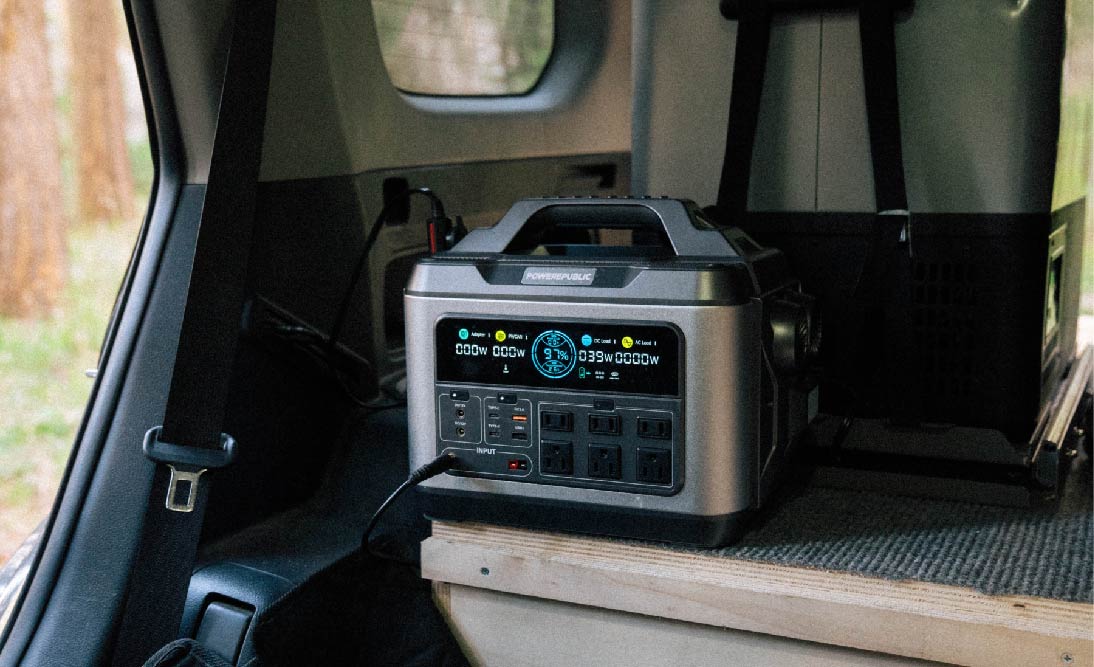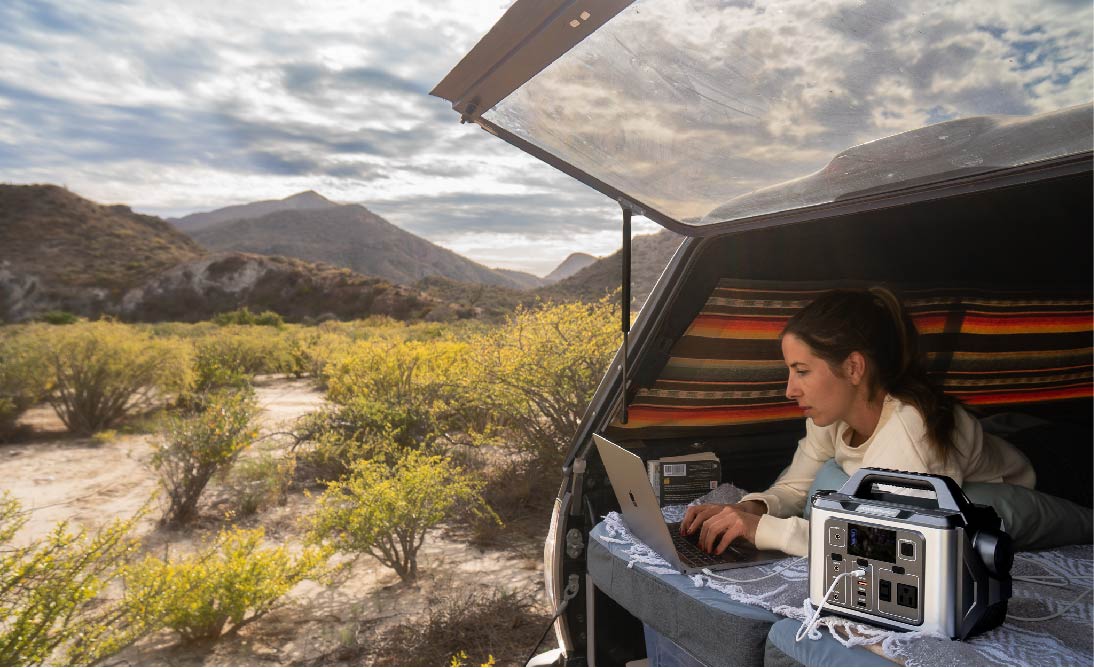Table of Contents:
-
Pairing the Best Off-Grid Solar Batteries with Right-Sized Solar Panels, Inverters, and Controllers
-
Is It Possible To Use Portable Power Stations as Off-Grid Batteries?
-
Best Off-Grid Solar Batteries: POWEREPUBLIC Portable Power Stations
-
FAQ III: Is It Possible to Use a Portable Power Station to Power an Entire House?
Off-grid solar batteries are a cornerstone of sustainable energy systems, particularly in areas disconnected from the main electricity grid or those that experience frequent power outages. They store energy generated by solar panels, providing a reliable power source when direct sunlight isn't available. Understanding the functionality, applications, types, and price ranges of off-grid solar batteries is key to optimizing your renewable energy setup. With this knowledge, you'll have a better idea of how to select the best off-grid solar batteries according to your energy needs, budget, and other factors.
In this article, we are going to discuss every aspect of off-grid solar batteries, including how to pair them with appropriately sized solar panels and inverters to fully cover your power needs. Additionally, we will provide options for those seeking a more budget-friendly and compact alternative, like the POWEREPUBLIC portable power stations. Whether you are looking for a comprehensive system or a compact power solution, we hope you find this article useful.
Intro to Off-Grid Solar Batteries
The off-grid solar batteries serve as the heart of solar energy systems. They store the electricity generated by solar panels during the day, making it available for use at night or during cloudy weather. This storage capability is essential for maintaining a consistent energy supply, and the best off-grid solar batteries are engineered for high efficiency and long-lasting performance.
Applications of Off-Grid Solar Batteries
These batteries have diverse applications. They are vital in remote areas lacking grid connectivity, for residential homes seeking energy independence, in agricultural settings, and even in portable solar setups like those used in RVs or camping. The best off-grid solar batteries ensure a dependable energy supply, making them indispensable in a variety of settings.

How Do Off-Grid Solar Batteries Work?
Off-grid solar batteries work by storing the DC electricity produced by solar panels. During daylight hours, solar panels convert sunlight into electricity. This energy is then channeled to the batteries. The best off-grid solar batteries are coupled with an inverter, which converts the stored DC power into AC power, usable for household appliances and tools.
Types of Off-Grid Solar Batteries
There are several types of batteries used in off-grid systems.
-
Lead-acid batteries are cost-effective but have shorter lifespans.
-
Lithium-ion batteries(or LiFePO4 batteries), though pricier, offer longer lifespans and better energy density.
The choice of the best off-grid solar batteries will depend on specific needs, budget, and the intended application.
Price Range and Examples
The price of off-grid solar batteries varies. Basic models may start from a few hundred dollars, while advanced, high-capacity batteries can cost several thousand dollars. For example, a typical lithium-ion battery with a capacity of 10 kWh might cost around $5,000 to $7,000. This investment, however, pays off through better efficiency and longer life.
A simple calculation can illustrate the utility of these batteries: If a household consumes an average of 30 kWh per day, a 10 kWh battery provides roughly a third of this daily requirement. It means that during sunless periods, the best off-grid solar batteries can significantly reduce reliance on other power sources.
Overall, the best off-grid solar batteries are pivotal in ensuring a stable and sustainable power supply in off-grid solar setups. Their role in a variety of applications, combined with technological advancements, makes them a smart investment for those pursuing energy independence and environmental sustainability.
Why Do You Need Off-Grid Solar Batteries?
Off-grid solar batteries are more than just an energy storage solution; they are a gateway to energy independence and sustainability. In this section, we’ll explore the pros and cons of these systems. Knowing them will help you make a better decision on selecting the best off-grid solar batteries for your needs.
Pros of Off-Grid Solar Batteries
-
Energy Independence: One of the most significant advantages of using off-grid solar batteries is the independence they offer. In areas without grid access or where power outages are common, these batteries ensure a continuous power supply. For example, a household with a 10 kWh off-grid solar battery system can maintain critical operations during outages, using the stored energy from solar panels.
-
Environmental Impact: Off-grid solar batteries contribute to reducing carbon footprints by relying on renewable solar energy. This shift from fossil fuels to cleaner energy sources is vital for environmental conservation.
-
Cost Savings in the Long Run: Although the initial investment in off-grid solar batteries can be substantial, they can offer significant savings over time. With proper maintenance, these batteries can last for years, offsetting their upfront cost by reducing or eliminating electricity bills.
Cons of Off-Grid Solar Batteries
-
Initial Investment: The primary drawback is the initial cost. High-quality off-grid solar batteries, like lithium-ion or LiFePO4 models, can be expensive. This investment might be challenging for some budgets, but the long-term benefits often justify the cost.
-
Maintenance and Lifespan: Depending on the type, some off-grid solar batteries may require regular maintenance, and their lifespan can vary. Compared to lithium-ion batteries, lead-acid batteries, for instance, are more budget-friendly but have shorter lifespans.
-
Technical Complexity: Setting up an off-grid solar system with batteries requires a certain level of technical knowledge. It’s important to correctly size the system to meet your energy needs and to ensure all components, such as inverters and solar panels, are compatible.
Examples and Calculations
Let's consider a practical example: If you install a 10 kWh off-grid solar battery system, and your daily energy usage is around 30 kWh, this system can cover approximately one-third of your daily energy needs without any input from the grid. In a scenario where the average electricity cost is $0.13 per kWh, using off-grid solar batteries for this portion of your energy needs could save you around $1.30 per day, which adds up to significant savings over time.

In short, off-grid solar batteries are an excellent investment for those looking to achieve energy independence, reduce environmental impact, and save on long-term energy costs. While the initial investment and technical complexity can be cons, the benefits of a well-designed off-grid solar system are substantial and far-reaching. It is very useful to know as it will help you select the best off-grid solar batteries.
How to Select the Best Off-Grid Solar Batteries?
Choosing the best off-grid solar batteries involves a blend of understanding your energy needs, the types of batteries available, and their cost-effectiveness. Here's an expanded look with more examples and calculations to guide you.
1. Detailed Energy Needs Assessment
-
For a Small Cabin: Suppose your energy requirement is modest, say around 10 kWh per day. In this case, a 5 kWh battery system might be sufficient, especially if you're looking to cover essential appliances like lights and a small refrigerator.
-
For a Large Home: If your consumption is about 50 kWh per day and you wish to be 60% independent from the grid, you'll need a 30 kWh battery system.
2. Types of Batteries: Expanded Examples
-
Lead-Acid for Seasonal Use: These are great for places like a summer cabin, where you need power only for part of the year. A 200Ah, 12V battery (about 2.4 kWh) could power basic needs for a few days.
-
Lithium-Ion for Daily Use: For a home that requires consistent, daily power, a 10 kWh lithium-ion battery is better suited. It's more reliable and requires less maintenance.
3. Application-Specific Scenarios
-
For Off-Grid Farming: A larger setup, perhaps 20-30 kWh, is needed to power equipment and lights. Here, lithium-ion batteries are preferred due to their durability and deeper discharge capability.
-
For Emergency Backup: A smaller 5-10 kWh battery can provide critical power during outages, ensuring that essentials like heating, lighting, and refrigeration are maintained.
4. Cost-Effectiveness with Detailed Calculations
-
Example for Small Cabin: A 5 kWh lead-acid battery system costing around $2,000, with an estimated lifespan of 5 years, costs $400 per year. If it reduces grid usage by 10 kWh/day, with electricity priced at $0.15/kWh, annual savings amount to $547.50, making it a profitable investment over its lifespan.
-
Example for Large Home: A 30 kWh lithium-ion battery system may cost around $20,000. Over a lifespan of 10 years (costing $2,000/year), and assuming it covers 60% of daily usage (saving 30 kWh/day), the annual savings at $0.15/kWh would be $1,642.50. This not only offsets the annual cost but also offers additional long-term savings.
5. Efficiency and Durability Considerations
-
Efficiency Example: A lithium-ion battery with 95% efficiency and 5000 cycles would be a better long-term investment compared to a lead-acid battery with 80% efficiency and 1000 cycles, even if the initial cost is higher.
6. Compatibility and Scalability
-
Scaling Up Example: Start with a 10 kWh system and add more modules as your energy needs grow. Ensure the initial setup is compatible with additional battery modules.
-
Ensure the batteries are compatible with your solar panels and inverter. For a seamless integration, the voltage and capacity should match the system's requirements.
7. Brand and Warranty Importance
-
Warranty Example: Choose a brand offering at least a 10-year warranty, which suggests reliability and durability.
8. Examples: Real-Life Scenarios
-
Household with Solar Panels: If your solar panels generate 40 kWh/day, but your consumption is 30 kWh/day, a 15 kWh battery can store the surplus for night use or cloudy days, maximizing your solar investment.
-
Off-Grid Vacation Home: A 7 kWh lithium-ion battery can power essential appliances over the weekend, ensuring comfort without the need for grid electricity.

Overall, the best off-grid solar batteries are those tailored to your specific needs and usage patterns. Whether it's for a small cabin or a large household, understanding your requirements and the available options is key to making an informed and cost-effective choice. Remember, the right battery system not only provides energy independence but also contributes to sustainability and long-term savings.
Pairing the Best Off-Grid Solar Batteries with Right-Sized Solar Panels, Inverters, and Controllers
To maximize the efficiency of your off-grid solar system, it's essential to properly match your off-grid solar batteries with the right-sized solar panels, inverters, and controllers. Here's a more detailed guide with examples and calculations to help you make the best choices.
1. Pairing with Solar Panels
For a 10 kWh Battery System:
-
Solar Panel Sizing: Assume you get about 5 hours of effective sunlight per day. To fully charge a 10 kWh battery, you'll need solar panels that can generate 2 kWh per hour. Thus, a setup of about 2 kW is appropriate.
-
Example Calculation: If you use 300W solar panels, you'll need approximately 7 panels (2000W / 300W per panel).
For a 5 kWh Battery System:
-
Solar Panel Sizing: With the same 5 hours of sunlight, a 1 kW solar panel system would suffice.
-
Example Calculation: If each panel is 250W, you'll need 4 panels (1000W / 250W per panel).
2. Matching with Inverters
-
For Both Systems: The inverter should be able to handle the peak load of your household and a bit more. For a household that might peak at 5 kW, a 6 kW inverter is a good choice, providing some buffer.
3. Sizing the Charge Controller
For the 2 kW Solar Panel System:
-
Charge Controller Sizing: If your system voltage is 48V, the current from the solar panels would be around 42A (2000W / 48V). A charge controller that can handle at least 50A would be suitable.
For the 1 kW Solar Panel System:
-
Charge Controller Sizing: With a 48V system, the current would be about 21A (1000W / 48V). A 25A charge controller would work well.
4. Example for a Residential Home:
-
Battery: 20 kWh capacity.
-
Solar Panels: Assuming 4 hours of effective sunlight, you need a 5 kW system (20 kWh / 4 hours).
-
Inverter: A 7 kW inverter to manage peak loads.
-
Charge Controller: For a 48V system, the current from panels is approximately 104A (5000W / 48V). A controller rated for at least 110A is ideal.
5. Example for a Small Cabin:
-
Battery: 5 kWh capacity.
-
Solar Panels: With 5 hours of sunlight, a 1 kW system is needed (5 kWh / 5 hours).
-
Inverter: A 2 kW inverter to cover typical appliances.
-
Charge Controller: For a 48V system, the current would be about 21A (1000W / 48V). A 25A controller is sufficient.
6. Additional Considerations
-
Efficiency Losses: Factor in a 10-15% loss due to inefficiencies in the system. If you calculate a need for 2 kW, consider installing a 2.3 kW system to compensate.
-
Future Expansion: If you plan to add more appliances or increase usage, consider scaling up your components accordingly.

Choosing the best off-grid solar batteries is just the beginning. By carefully sizing and pairing your off-grid solar batteries, panels, inverters, and controllers, you can ensure that your off-grid solar system runs efficiently and meets your energy needs. These examples and calculations serve as a starting point but always consult with a solar energy expert to tailor the system to your specific circumstances. Remember, a well-designed system not only provides energy independence but also maximizes the return on your investment.
Is It Possible To Use Portable Power Stations as Off-Grid Batteries?
Yes, it's possible to use portable power stations as off-grid batteries.
Why?
-
Portable power stations can store energy from solar panels or other sources, offering a versatile and mobile power solution. They complement the off-grid solar batteries, especially in scenarios requiring portability or temporary power solutions.
Factors to Consider While Using a Portable Power Station as an Off-Grid Battery
-
Capacity and Output: Match the power station's capacity to your needs. They are usually less powerful than off-grid solar batteries.
-
Charging Options: Ensure compatibility with solar panels or other renewable sources.
-
Portability vs. Stability: Ideal for temporary or mobile setups, not as a replacement for more robust, stationary off-grid systems.

How to Recharge Portable Power Stations?
-
Solar Panels: Most portable stations can be charged via solar panels, aligning with off-grid setups.
-
AC Grid Power: Useful for quick charging, but not always an off-grid option.
-
Car Chargers: Beneficial for mobile setups.
Can I Use a Portable Power Stations While Charging It?
-
Yes, you can!
-
Many models support pass-through charging, allowing use while recharging, although this may impact battery longevity and efficiency.
Pros and Cons of Using a Portable Power Station as an Off-Grid Battery
Pros
-
Flexibility and Mobility: Ideal for mobile or temporary needs.
-
Ease of Use: User-friendly, often requiring minimal setup.
-
Diverse Charging Options: These can be charged via solar, AC, or DC sources.
Cons
-
Lower Capacity: Generally less capacity compared to the off-grid solar batteries.
-
Dependent on Charging Source: Effectiveness can be limited in areas with inadequate sunlight or charging facilities.
-
Price vs. Performance: They can be expensive for the amount of energy stored and delivered.
Price Range of Portable Power Stations
-
Portable power stations can range from a few hundred to over a thousand dollars, depending on capacity and features.
-
For example, a 500Wh unit might cost around $500, while a more robust 1000Wh unit could be around $1,000 or more.
Example Calculations
-
For a Small Cabin or RV: If your energy needs are around 5 kWh daily, a 500Wh portable power station could provide essential power for lighting and small devices. Assuming 5 hours of sunlight, a 100W solar panel would take about 5 hours to charge it fully.
-
Cost Savings: Using the portable station to power a 50W appliance for 10 hours (500Wh usage) instead of a generator could save about $2 per day (assuming generator operating costs of $0.40 per kWh). Over a year, this adds up to about $730 in savings.
So, while portable power stations can be used as off-grid batteries, they serve best in specific scenarios like temporary setups, mobile use, or as a supplement to off-grid solar batteries. Their flexibility, ease of use, and diverse charging options make them an attractive choice, but their lower capacity and higher cost per stored kWh compared to traditional off-grid batteries should be considered. Whether they're the right choice depends on the individual's specific power needs, budget, and use case scenario.
Best Off-Grid Solar Batteries: POWEREPUBLIC Portable Power Stations
From the discussion above, we understand that portable power stations can function as off-grid batteries, being particularly effective in specific scenarios such as temporary setups, mobile use, or as supplements to off-grid solar battery systems. However, if your energy needs exceed what portable power stations can provide, an off-grid solar battery system would be a more suitable choice.

Therefore, for those seeking a reliable power solution for temporary setups or mobile use, consider the POWEREPUBLIC T2200 and T3000 models. Both serve as excellent alternatives for use in off-grid settings and for mobile applications. To assist you in evaluating and analyzing their functionality, we have compiled a table detailing their important features and specifications.
|
Feature/Model |
||
|
Capacity |
2240Wh/100,000mAh |
3200Wh/125,000mAh |
|
Continous Power |
2200W |
3000W |
|
Peak Power |
4500W |
6000W |
|
Battery |
LiFePO4 |
LiFePO4 |
|
Output Ports |
6*AC, 3*USB, 1*QC3.0, 2*Type C, 2*DC/12V, 1*Car Port Total of 15 |
6*AC, 3*USB, 1*QC3.0, 2*Type C, 2*DC/12V, 1*Car Port Tota of 15 |
|
Charging Methods |
AC Adapter, Solar Panel, Car Charger |
AC Adapter, Solar Panel, Car Charger |
|
Solar Input |
230W Compatible with POWEREPUBLIC Portable Solar Panels |
230W Compatible with POWEREPUBLIC Portable Solar Panels |
|
Additional Features |
LDC Screen/Aluminum-alloy Body/LED Light |
LDC Screen/Aluminum-alloy Body/LED Light |
|
Weight |
64Ibs/30Kg |
88Ibs/40Kg |
|
Dimensions |
18.3*11.8*12.2 inch |
18.3*11.8*14.5 inch |
|
POWEREPUBLIC - 4.5 on Trustpilot |
||
|
Operation Time(h) |
Est.Operation Time(h)=Capacity(Wh) * 0.85 / The power of the item(W) |
|
|
Wi-Fi Router (150W - 250W) |
7.5 to 12.5 hours |
10.5 to 18 hours |
|
LCD TV (200W - 400W) |
4.5 to 9 hours |
6.5 to 13 hours |
|
Microwave Oven (600W - 1200W) |
1.5 to 3 hours |
2.3 to 4.5 hours |
|
Refrigerator (500W - 800W) |
2 to 3.5 hours |
3.5 to 5.5 hours |
|
Washing Machine (500W - 1500W) |
1.3 to 3.5 hours |
1.8 to 5.5 hours |
|
Toaster (800W - 1500W) |
2.3 to 3.5 hours |
3.5 to 5.5 hours |
|
Space Heater (1000W - 1500W) |
2 to 3.5 hours |
2.5 to 5.5 hours |
|
Air Conditioner (1000W - 3000W) |
1000W - 2200W: 0.8 to 2 hours 3000W: Not Applicable |
1 to 2.5 hours |
Note That:
-
The estimated operation time is calculated based on running a single device at a time with the power station fully charged. It's important to remember that power consumption can vary depending on the brand.
-
You should always verify the continuous and surge power requirements of your appliances against the capacity of the power station. Ensure that the overall power demand, encompassing both the running and starting power, does not surpass the output capacity of your power station.
FAQ I: What’s the Lifespan of Portable Power Stations?
Answer: The lifespan of portable power stations depends on several factors, including the battery type, usage frequency, and maintenance.

Generally, these are the key points to consider:
-
Battery Type: Most portable power stations use lithium-ion or LiFePO4 batteries. Lithium-ion batteries typically have a lifespan of 500 to 1000 charge cycles, while LiFePO4 batteries can last for up to 2000 cycles or more.
-
Usage: Frequent deep discharges and high loads can shorten the lifespan. For instance, using a power station close to its maximum capacity regularly can lead to quicker degradation.
-
Maintenance: Proper storage and usage, like keeping the battery in a cool, dry place and avoiding full discharges, can prolong its lifespan.
-
Example Calculation: If you use a power station with a lithium-ion battery for 500 cycles, and you recharge it once a week, it could last for about 9.6 years (500 weeks / 52 weeks per year).
FAQ II: How to Find the Right-Sized Portable Power Station?
Answer: Selecting the right-sized portable power station involves assessing your power needs based on the devices you plan to run.

Here's how you can determine the appropriate size:
-
List Your Devices: Write down all the devices you plan to power, like a laptop, phone, lamp, TV, refrigerator, etc.
-
Calculate Total Wattage: Determine the wattage of each device. For example, a laptop might use 60W, and a phone charger might use 18W.
-
Consider Usage Time: Estimate how long you will use each device. If the laptop is used for 5 hours, it would consume 300Wh (60W x 5h).
-
Add Up the Wattage: Sum the total watt-hours for all devices for a day. This gives you the minimum capacity you need for a day.
-
Factor in a Buffer: It's wise to add a 20-30% buffer to the calculated total to account for inefficiencies and unexpected usage.
-
Example Calculation: Laptop (300Wh) + Phone (90Wh) = 390Wh daily need. Adding a 25% buffer, you would need a power station with at least 487.5Wh capacity.
FAQ III: Is It Possible to Use a Portable Power Station to Power an Entire House?
Answer: In most cases, a portable power station cannot power an entire house due to capacity limitations. However, it can power essential items during short outages or for specific needs. Here's what to consider:
-
Capacity Limitations: Most portable stations have capacities ranging from 500Wh to 3000Wh, which may not be sufficient for all household appliances, especially high-wattage items like air conditioners, large refrigerators, or heaters.
-
Prioritize Essential Devices: Focus on critical needs like lighting, charging phones, or running a small fridge.
-
Example for Critical Load: If you have essential loads like a fridge (800W), some lights (100W), and a phone charger (18W), a 1000Wh power station could run these for a few hours (e.g., the fridge for about 1 hour, lights for 10 hours, and phone charger for several hours).

So portable power stations offer great flexibility and convenience, their capacity and output limitations make them more suited for specific devices or temporary power solutions rather than powering an entire house.
Final Thoughts
In conclusion, selecting the best off-grid solar batteries is crucial for achieving energy independence and sustainability, especially in areas disconnected from the grid or prone to power outages. These batteries, whether traditional types for comprehensive systems or portable options like the POWEREPUBLIC T2200 and T3000 models provide reliable and efficient energy storage. The best off-grid solar batteries ensure a consistent power supply, tailored to individual needs and varying from small cabins to large homes. They also offer environmental benefits and long-term cost savings, despite the initial investment and technical complexity.
For those needing a more flexible and mobile solution, portable power stations can complement the best off-grid solar batteries, offering a versatile option for temporary setups or as a supplementary power source. Ultimately, the best off-grid solar batteries are those that align with your specific energy requirements, budget, and the unique demands of your living or working environment, paving the way toward a more sustainable and self-sufficient lifestyle.
Choose POWEREPUBLIC Portable Power Station and Solar Generator Kits for Temporary Setups or Mobile Use.
